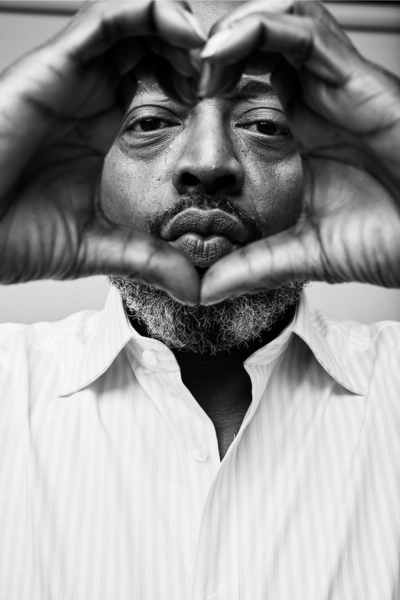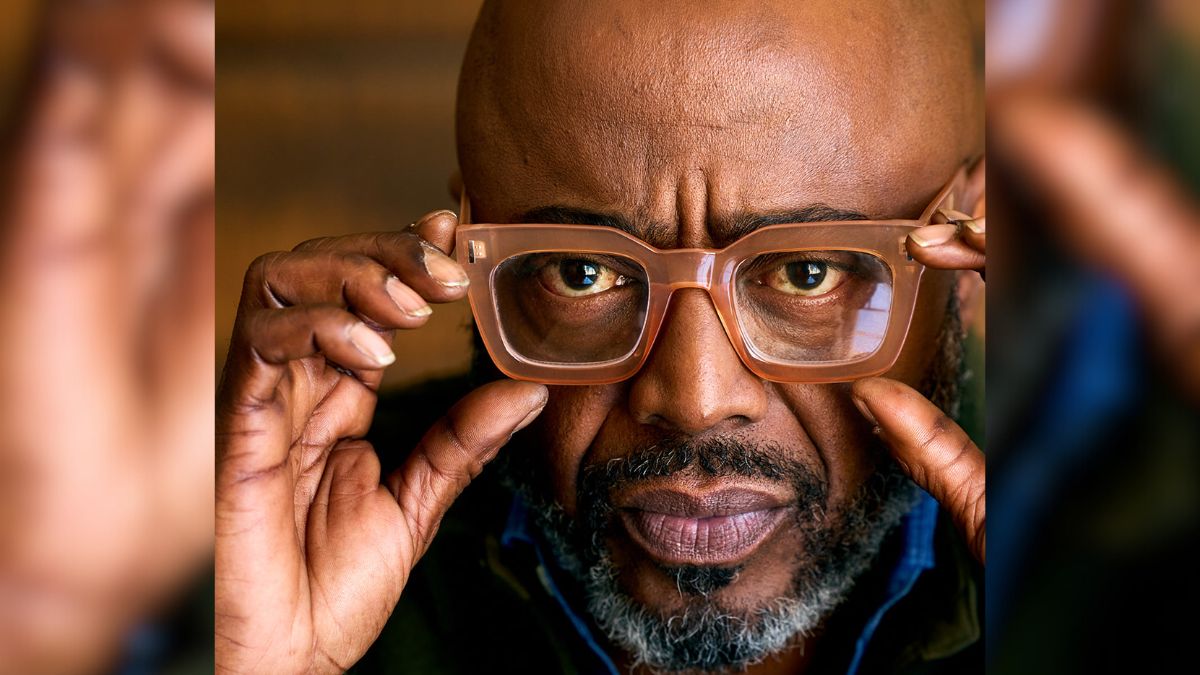Comedian Donnell Rawlings, best known for his work on Chappelle’s Show, opens up about his career, friendship with Dave Chappelle, and his upcoming stand-up performances at the Chicago Improv in Schaumburg (Photo Credit: Paul Smith).
Many recognize Donnell Rawlings from Chappelle’s Show (as Ashy Larry), where he starred in several memorable sketches. His iconic catchphrase, “I’m rich, biaaaaatch!” and “Son!” became a fan favorite and still resonate with audiences today. Recently, Donnell made waves on The Breakfast Club morning show (On Youtube), where he hilariously passed out bottles of baby oil alongside DJ Envy, Charlamagne Tha God, and guest host Loren Lorosa (Jess Hilarious on maternity leave). During the show, Donnell explained a viral photo of him with P. Diddy, and the comments were full of praise for the interview, which didn’t disappoint. His interview with Dr. Umar, in which they discussed the topic of white women, also drew plenty of attention.
For those wanting to catch Donnell live and unfiltered, he’ll perform at the Schaumburg Improv from Thursday, Oct. 10 to Saturday, Oct. 12, offering fans an up-close and personal experience with the comedian.
In a recent Q&A with The Chicago Defender, Donnell Rawlings shared insights into the start of his career, his long-standing friendship with Dave Chappelle, and his future aspirations. He also offered candid thoughts on Sean “P. Diddy” Combs.
Marshelle Sanders: How are you today? I got my questions ready for you Donnell
Donnell Rawlings: No, I don’t use baby oil; I use lotion….
Marshelle Sanders: (laughs) Okay, that’s cool because I did watch the Breakfast Club Morning Show Interview. Thank you so much for the opportunity to chat with you about your career and next moves. You’re coming to Schaumburg next week for the Black and Mild Tour. What can we expect from the show, and where does the tour name come from?
Donnell Rawlings: “The Black and Mild Tour” was inspired by a bit of conflict with a Chicago comedian who said my comedy wasn’t ‘hot,’ calling it ‘mild.’ It got me thinking—I don’t even like hot sauce as much as I used to, thanks to some digestive issues! (laughs). But really, it’s more about making comedy digestible. My style is sharp, but it’s something everyone can enjoy. I’m not here to be disgusting or insulting. So, I took what was meant as an insult and turned it into something that works for me. You’ll get a loud, fun performance with a diverse crowd at my shows—gang members, regular folks, everybody. It’s become a brand that reflects my style, and people love it.
Marshelle Sanders: You grew up in Washington, D.C., influencing your journey. How did your upbringing there shape your path into comedy?
Donnell Rawlings: I wasn’t the biggest or most athletic kid growing up. I had to find my way in other areas, and being funny became a defense mechanism. You’re out in the schoolyard; if you didn’t know how to roast people, they’d roast you! It was survival, in a way. But honestly, I never thought of pursuing comedy as a career. It wasn’t something I set out to do. I was a military police officer in the Air Force, and when I got out, I was waiting to become a D.C. police officer.
[perfectpullquote align=”full” bordertop=”false” cite=”” link=”” color=”” class=”” size=””]I was a security guard at a grocery store when this guy who worked for a promotions company gave us free comedy show tickets. We’d go just for fun, but one day, people started saying I should get on stage because I was cracking them up. The club owner challenged me to perform; next thing you know, I’m up there. Thirty-three years later, I haven’t looked back. I never gave myself a Plan B or C; I just stuck with it.[/perfectpullquote]
Stand-up evolved for me—over time, I realized it was more than just telling jokes. It was about bringing characters to life and showing different sides of myself. That eventually led me to acting. So, no, I wasn’t one of those comedians who always dreamed of doing this.
Opportunities came my way; I recognized them and went after them. I always tell people that everyone has a God-given talent. The hard part is identifying what that talent is. Once you find it, you go all in and pursue it without hesitation.
Marshelle Sanders: That’s true; going with the flow sometimes and following your intuition is essential. Now, let’s dive into your recent work—specifically, your stand-up special “A New Day” on Netflix. How did it feel to get that out there finally?”
Donnell Rawlings: It felt great. “A New Day” wasn’t my first special, but it truly evolved my comedy. The first time I taped it, the material was too tied to the pandemic and featured COVID jokes that wouldn’t age well.
Dave Chappelle advised me to aim for something timeless, so I took that feedback seriously. I rewrote my material and refined my point of view, resulting in a final version that could stand the test of time. Initially, my special felt like a collection of jokes that needed a clear beginning or personal perspective. However, I realized that I had to capture everything I needed at that moment.
This was my third attempt at the special, recorded right after the pandemic when audiences still felt its effects. While some jokes may have been funny, they didn’t create a great special. By listening to constructive criticism, I returned to the drawing board to craft relatable and meaningful jokes.

Photo Credit: Paul Smith
Marshelle Sanders: Speaking of Dave Chappelle, you’ve mentioned that he’s significantly influenced your life. Can you share what that friendship means to you?
Donnell Rawlings: Our friendship means more to me than any business relationship. While Chappelle’s Show helped boost my career, our connection genuinely matters. We’ve been through so much together; he was there when my son was born, and we’ve attended weddings and funerals, including Charlie Murphy’s. Whether we’re doing comedy or not, he’s one of my closest friends.
Many people assumed I must be upset about the Chappelle’s Show not moving forward, but my genuine concern was his mental state. He didn’t often share his feelings, making things uncertain regarding the Comedy Central situation. When I ran into him at a club in New York, I wanted to hug and slap him but felt relieved because I hadn’t seen him in a while.
Marshelle Sanders: That’s powerful. Being there for our friends when they need space and time is essential. Now, let’s shift our focus to your acting career. How do you feel about the roles you’ve taken on, like Alvin, the coroner and cousin of Lamar on “BMF” and Mr. Earl in “Winning Time: The Rise of the Lakers Dynasty.” Do you have any upcoming acting projects in the works?
Donnell Rawlings: I’m not overly focused on building a film or TV career, but I’m open to roles if they come my way. For me, acting is more about gaining exposure and encouraging people to come to see my stand-up, which is where my true passion lies. I don’t take anything for granted; I see any opportunity that comes my way as a blessing to bring more audiences to my comedy. Ultimately, I want to keep pushing my stand-up and sharing my experiences with people.
Marshelle Sanders: Got it. And you’ve got your podcast, The Donnell Rawlings Show. What motivated you to start that?
Donnell Rawlings: The idea for my podcast came from Joe Rogan. I told him I wanted to spend more time with my son (Austen), and he suggested starting a podcast. It provided me a platform to connect directly and unfiltered with my audience. I leaned into it as a creative outlet during the pandemic since live shows weren’t an option. It’s also a chance for people to glimpse my life and experiences. I love that I can express myself independently—no edits, just me. The podcast feels like a reality show about my life, allowing listeners to connect with me more deeply.
Marshelle Sanders: You recently had Dr. Umar on your YouTube show. How did that interview go?
Donnell Rawlings: Dr. Umar does much for the Black community, addressing history on multiple levels. However, I believe we can’t dictate who people should be with—everyone has their unique journey.
While I understand his position, it doesn’t apply to everyone, especially given the many successful individuals from biracial relationships. I wouldn’t try to outsmart him in our conversation; he’s too seasoned. Surprisingly, he remained calm and even laughed at some of my funny questions.
One of my producers, a young white guy, listened in, and the discussion about race and relationships was civil—nobody yelled or got upset. This shows that meaningful dialogue can happen without confrontation. On fatherhood, I have one son, and my goal is to inspire him to believe that anything in life is attainable through hard work. I want him to develop strong character, respect and love for others. If he chooses to pursue an entertainment career, he’ll need thick skin, but I remind him he doesn’t have to be funny—what matters is that he does what he loves. I strive to lead by example, creating lasting memories for him.
Marshelle Sanders: In your interview with The Breakfast Club, you touched on the Diddy case and the photo of you. What are your thoughts on everything that’s happening with him?
Donnell Rawlings: You know, it’s interesting. There are two sides to every story. I had the chance to learn one version of Diddy, and some of these accusers are sharing their experiences. In that photo, I saw a group of Black men enjoying each other’s company. It was a celebration of Blackness, fatherhood and friendship. People can interpret that image however they want, but that’s the energy I felt.
Diddy hosts gatherings like this every year, and I remember when Dave’s kids were hanging out with his kids. Everyone was out on the water, having fun together. It was a beautiful celebration of life and family and made a lasting impression.
[perfectpullquote align=”full” bordertop=”false” cite=”” link=”” color=”” class=”” size=””]Unfortunately, many people now see him as the devil. Still, those who have had the chance to work with him or receive undisputable opportunities have a different perspective, and that’s important to recognize as well.[/perfectpullquote]
Marshelle Sanders: After the tour, what does your future look like? Are there any upcoming projects or plans you’d like to share?
Donnell Rawlings: I’m always working on something new, and I often tell people just to Google me because I’ll pop up with my latest projects. My main focus is being the best dad I can be while pursuing opportunities in what I love to provide for him.
Marshelle Sanders: Speaking of your son (Austen, nine years old), how do you hope to inspire him through your work?
Donnell Rawlings: I want him to understand that anything is achievable if he puts in the effort. It’s important to me that he grows up to be respectful, kind and of solid character. He doesn’t need to follow my path, but I hope he puts his heart into whatever he decides to pursue.
For More Information
Who: Donnell Rawlings presents The BLACK & MILD tour
Where: Chicago Improv, 5 Woodfield Mall Store K120B, Schaumburg, IL
When: Thursday, Oct. 10 through Saturday, Oct. 12.
What Else: For show and ticket info, visit improv.com/chicago/comic/donnell+rawlings and www.donnellrawlings.com.



